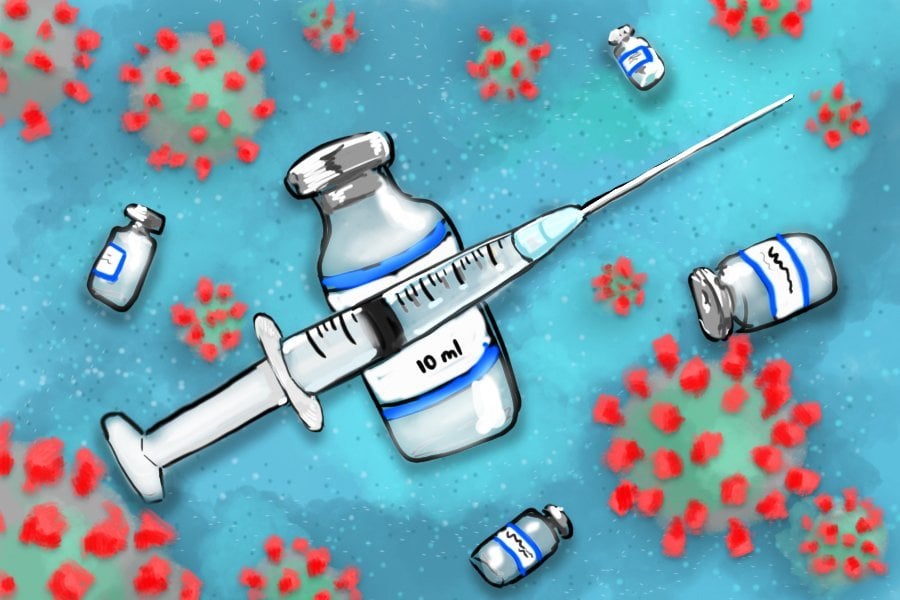Students participate in trial studying Moderna vaccine efficacy
Daily file illustration by Hank Yang
Students were able to participate in PreventCOVIDU, a Moderna vaccine trial testing the viability of the vaccine to contain transmission between people.
May 11, 2021
Sitting at his sister’s wedding in Arkansas earlier this month, Weinberg freshman Jacob Jarding said he was happy to experience a semblance of pre-pandemic tradition. But Jarding, who has not been vaccinated, was also concerned about contracting COVID-19.
“I was the only one with so much of a shadow of a mask on,” Jarding said.
Jarding is part of the group of students receiving a COVID-19 vaccine through the PreventCOVIDU study. Participants were randomly selected from an applicant pool, then separated into a delayed and an early vaccination group. Jarding was placed in the delayed group.
The study is a national trial by the National Institute of Allergy and Infectious Diseases testing the Moderna vaccine’s ability to prevent transmission of SARS-CoV-2 among vaccinated and unvaccinated individuals.
Students aged 18 to 26 who have not received a COVID-19 vaccine or been infected with SARS-CoV-2 were eligible to apply for the study. The trial began in April.
Northwestern student participants joined a group of about 12,000 students across 21 other universities nationwide in the study.
Students in the delayed vaccination group were still allowed to receive their vaccine at an earlier time outside of the study while continuing to participate in the trial.
Jarding said despite the disappointment of being placed in the delayed vaccination group, he is still going to wait to receive his vaccine as a part of the study. Since the study needs a control group and an experimental group to make comparisons between vaccinated and unvaccinated individuals, Jarding said waiting to get his vaccine may yield more accurate results.
Weinberg freshman Catalina Castro was part of the delayed vaccination group and decided to get her vaccine earlier.
“They told us that…they can’t deny you access to the vaccine for ethical reasons, especially because we’re in a pandemic,” Castro said.
McCormick freshman Marcos Sanchez, Jarding’s roommate, was identified as a “prospective close contact,” and asked to be a part of the study.
The study identified about 25,500 additional people as prospective close contacts or case-ascertained close contacts. According to PreventCOVIDU’s website, tracking potential spread to close contacts provides more information on the vaccine’s ability to prevent or reduce spread of the virus.
Sanchez said he was initially disappointed to hear that Jarding would be in the delayed group. Living in a pandemic, Sanchez said, means there is a constant risk that someone else may transmit COVID-19 to you.
“You never know who you’re gonna encounter or talk to who might have (COVID-19),” Sanchez said. “The vaccine adds a little less stress to your life.”
Castro said she applied for the study, in part, because of its potential to gauge the lasting impacts of the pandemic and to mitigate the effects of future pandemics.
Because Jarding agreed to be a part of the study, he hopes to contribute to public health knowledge as a part of the delayed vaccination group.
“It’s a great chance to influence public policy,” Jarding said. “My experience may directly impact how guidelines will be lifted, or if they will be lifted.”
Email: katrinapham2024@u.northwestern.edu
Twitter: @KatrinaPham_
Related Stories:
— NU students now eligible for compensated Moderna vaccine trial


